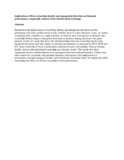| dc.contributor.author | K'Obonyo, Peter | |
| dc.contributor.author | Ongore, Vincent O. | |
| dc.contributor.author | Ogutu, Martin | |
| dc.date.accessioned | 2013-05-07T05:53:12Z | |
| dc.date.available | 2013-05-07T05:53:12Z | |
| dc.date.issued | 2011 | |
| dc.identifier.citation | International Journal of Humanities and Social Science | en |
| dc.identifier.uri | http://www.ijhssnet.com/journals/Vol_1_No_13_Special_Issue_September_2011/24.pdf | |
| dc.identifier.uri | http://erepository.uonbi.ac.ke:8080/xmlui/handle/123456789/19507 | |
| dc.description.abstract | Research on the implications of ownership identity and managerial discretion on firm performance has been yielded mixed results. Further, there is scanty literature, if any, on studies combining these variables in a single research. yet there is near-convergence in literature that ownership identity impacts managerial discretion in decision making processes. this paper presents results of a study that shows the intrrelationships between ownership identity and mangerial discretion and their impact on financial performance as measured by ROA, ROE and DY. State ownership of firms is particularly indicated for poor stewardship, whereas foreign, insider, diverse and institutional ownership gave the best results. The results also show signigicant positive relationship between managerial discretion and performance. Collectively, these results are consistent with pertinent literature with regard to the implications of government, foreighn manager( insider) and instititional ownership forms, but significatly differ concerning the effects of diverse ownership on firm performance | en |
| dc.language.iso | en | en |
| dc.relation.ispartofseries | Vol.1, No. 13 [ Special Issue, p.187-195, (2011)]; | |
| dc.title | Implications of firm ownership identity and managerial discretion on financial performance: empiricale evidence from Nairobi Stock Exchange | en |
| dc.type | Article | en |

